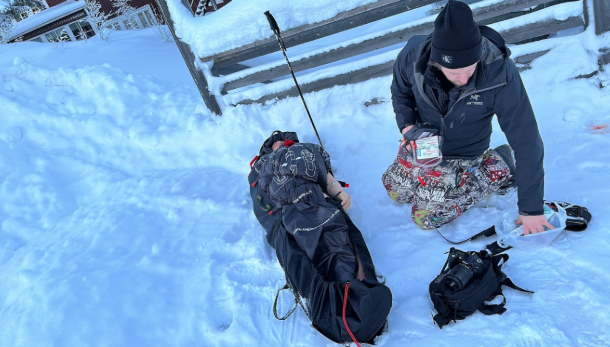
28/08/2025
Hypothermia, are you serious? Would you lie on a cold surface without insulation?
Would you lie on a cold, wet surface without insulation? While it might sound like a pointless question with a startlingly obvious answer, in the chaos of an emergency the basics are easy to forget. Yet every first responder knows that a patient who lies unprotected on cold ground, even in normal atmospheric temperatures quickly loses body heat – and the consequences can be serious.
Hypothermia is a silent, swift, and dangerous complication that can compromise survival long before hospital care is reached. It’s not just about environmental exposure, but contact, conduction, and the conditions we allow our patients to endure. Understanding hypothermia treatment begins with recognising that the surface beneath a patient can rapidly accelerate their decline if not properly managed.
What is hypothermia?
Hypothermia occurs when the body loses heat more quickly than it can generate it. Once the core body temperature falls below 35°C (95°F), physiological functions begin to slow. At this point, every minute counts. Hypothermia isn’t only about being exceptionally cold; it’s a life-threatening condition that impairs the nervous system, heart, and other vital organs.
The hidden danger of cold surfaces
Conduction is one of the fastest ways the body loses heat, especially when directly lying on a cold surface. Even in air temperatures that don’t feel life-threatening, contact with cold ground can dramatically accelerate heat loss. For trauma patients, particularly those immobilised or unconscious, this becomes a critical risk factor. Wet clothing, blood loss, and immobility all compound the danger.
Symptoms to watch for
Early symptoms of hypothermia include:
- Shivering
- Pale or cool skin
- Confusion
- Fatigue
As the condition progresses and worsens, patients may become disoriented, stop shivering, and show signs of slower breathing or a lower heart rate. Left untreated, hypothermia can lead to unconsciousness, cardiac arrest, and death.
Hypothermia treatment in the field
Preventing hypothermia in the field is not complicated but must be a priority, particularly if the casualty is exposed to cool, cold, or wet weather or advanced medical treatment is some time away. Effective measures that reduce temperature exposure include placing patients on insulating materials, shielding them from wind and moisture, and using barrier devices. Simply avoiding direct ground contact can make the difference between life and death.
Immediate rewarming is the foundation of hypothermia treatment. This includes removing wet clothing, covering the patient with insulating layers, and applying heat packs if available. In severe cases, rapid transport to hospital and active rewarming techniques are necessary.
In prehospital environments, hypothermia prevention and management solutions like the Xtract™SR Heatsaver have proven highly effective. Designed for hostile conditions, it limits heat loss, improves patient comfort, and supports the chain of survival from the moment care begins.
Find out more
For more information on the Xtract™SR Heatsaver and how it can help to safeguard casualties from the dangers of hypothermia, please contact TSG Associates today and our team will be delighted to help.




.png)







